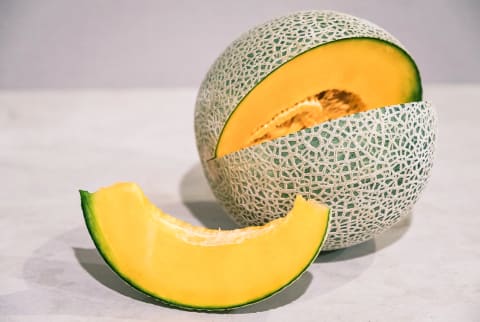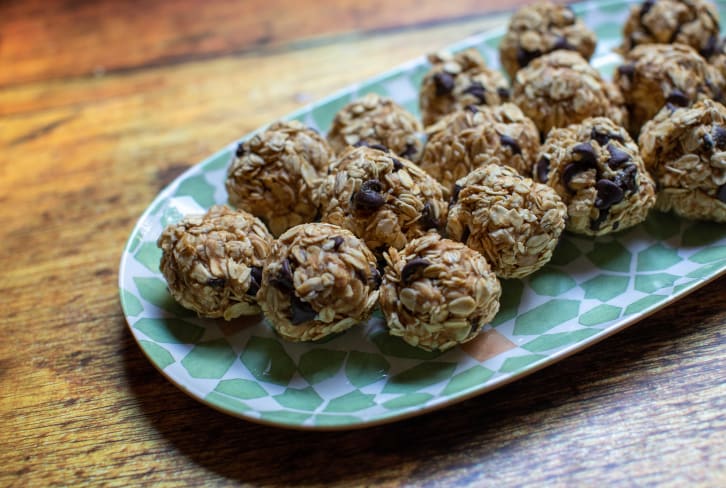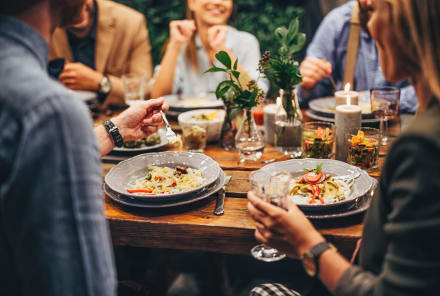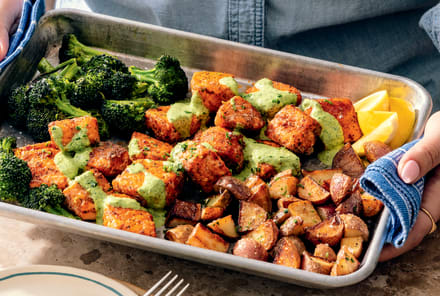Advertisement
Eat A Plant-Based Diet? Make Sure You Get These Vitamin-B-Rich Foods


B vitamins are more like a symphony than a one-hit wonder. Made up of eight different vitamins—thiamine (B1), riboflavin (B2), niacin (B3), pantothenic acid (B5), vitamin B6, biotin (B7), folate (B9), and vitamin B12—they work synergistically in the body.
Enzymes are behind every aspect of cellular functioning1, and the B vitamins act as coenzymes to help your enzymes work and are involved in many of the body's key operations. As well as helping the body produce and maintain new cells, they keep your metabolism2 humming, your hormones balanced, your heart beating, your neurotransmitters1 firing, and your energy levels up. B vitamins have also been shown to fend off PMS3, anxiety4, and stress4. They do a lot.
Like instruments in an orchestra, they also have distinct functions. Vitamin B12 has been shown to ease depression5, B5 has been linked to improved skin6, riboflavin may help prevent migraines7, and folate reduces the risk of spina bifida and neurological8 birth defects during pregnancy.
Why do you need vitamin B-rich foods?
All B vitamins are water-soluble, which means they can't be stored in the body. Translation: You must get your daily B-vitamin intake through your diet to reap all the aforementioned rewards.
The good news is that eating a healthy, balanced diet usually keeps your B's covered, but there are exceptions. "Stress leads to an increased need for B vitamins. Also, alcohol, contraceptive pills, sugar, nicotine, and caffeine impair their absorption, says Mia Lundin, R.N., CNP, co-author of The Hormone Balance Cookbook.
Also keep in mind that plants don't make B12, so strict vegetarians and vegans are at high risk for developing a B12 deficiency if they don't get vitamin-B12-fortified foods or take a supplement. Symptoms of vitamin B12 deficiency include fatigue, brain fog, and tingling in the hands and feet.
So what foods should you be eating?
There are plenty of tasty ways to add vitamin B foods to your diet, from meat to mushrooms, even a few unexpected sources of vitamin B (bananas, really?):
Potatoes
Potatoes often get overshadowed by their more colorful counterparts (cough, kale), but spuds are a standout vitamin-B food. As well as containing fiber, potassium, and vitamin C, they're loaded with niacin, thiamin, folate, and B6. In fact, a baked potato provides almost 40% of your daily requirement of B6. Skip the butter, and try this delish Smashed Potato recipe.
Greens
Yes, broccoli and leafy greens like spinach and mustard greens get props for folate, a nutrient that helps the body make new cells, but did you know asparagus is an excellent source too? Just four spears deliver 20%9 of your daily recommended dose. Great grilled or raw in a crudité, asparagus also works as a pizza topper and sandwich filler. Heck, there are loads of ways to eat it.
Beans
Beans, beans, good for the heart, the more you eat, the more… B vitamins you get! Not only do legume family favorites like kidney beans, chickpeas, and black-eyed peas deliver protein and fiber, they’re rich in B vitamins. Take canned chickpeas. One cup provides significant amounts of folate, B5, and 55%10 of your daily value for B6. Turn them into hummus, curry, or even caramel sauce (no joke!).
Meat
Your grandma was onto something with liver. One serving of beef liver is loaded with B vitamins, including 10 times11 the daily recommended dose of B12. Not that vitamin B foods are limited to liver. One 3-ounce serving of chicken or turkey breast has half12 the recommended daily amount of niacin, which aids in metabolism, plus lean pork is loaded with thiamin, which is needed for nerve function—all great news for keto devotees.
Dairy
The dairy case isn't all about calcium. If you grab organic milk, pastured eggs like Vital Farms, or yogurt, you're also getting niacin, B5, B12, thiamin, and especially riboflavin, which is important for energy production. Just 1 cup of yogurt gives you 35%13 of your daily dose. Eggs have a little something extra up their shells: biotin. One egg delivers 10%14 of your daily dose, so get cracking for breakfast or hard-boil a few to add to salads or brown rice bowls.
Fish and seafood
Nuts and seeds
Sunflower seeds may be small, but they're mighty sources of B vitamins. One serving (about 4 tablespoons) provides almost 25%15 of your daily recommended amount of B5, plus the kernels are packed with folate, for DNA synthesis, and B6, for cognitive development. Add them to your oatmeal or smoothie, or make a sunflower butter and jam sandwich. Popping pumpkin seeds, peanuts, and almonds will also get your B's.
Fermented foods
Kombucha isn't just a trendy drink. During the fermentation process, yeast and bacteria break down sugars into beneficial substances, spiking the fermented tea with thiamin, riboflavin, B6, and B12. Fermented favorites like kimchi, sauerkraut, kefir, tempeh, and miso also supply B, plus they're super sources of probiotics to improve gut health and boost your mood.
Bananas
Yeah, yeah, we all know bananas are packed with potassium, but they also deliver niacin, folate, and 20%10 of your daily B6 requirements, a key ingredient for protein metabolism. A healthy way to satisfy your sweet tooth, try this Banana Nice Cream Sundae or Matcha Banana Bread.
Nutritional yeast
Fortified nutritional yeast—or "nooch" for short—is loaded with B vitamins. Some brands deliver as much as 100% of your daily needs for thiamin, riboflavin, niacin, B6, folate, and B12 in just 1 tablespoon; just check the nutritional label as amounts vary. This is great news for vegans who often have trouble getting enough B12—and anyone looking for a nutrient-dense, cheesy-like flavoring to sprinkle on popcorn, kale chips, and avocado toast.
Avocado
Guac just got better. Not only are avocados full of fiber, potassium, and magnesium, they're a B vitamin16 fiesta. Half an avocado delivers more than 10% of your daily needs for folate, B5, B6, niacin, and riboflavin. Try this creamy, dreamy Chocolate Avocado Mousse.
Breakfast cereals
Good news: Studies17 show that fortified cereals can boost levels of B vitamins. Bad news: While standard issue Cheerios and Grape-Nuts are fortified with B vitamins, many of the healthier cereal choices are not, so be sure to check nutrition labels. Two of our favorite fortified finds: Kashi Heart-to-Heart Instant Oatmeal and Ezekiel 4:9 Almond Flake Cereal. Splash in some B12-fortified nut milk, like Tempt Original Hemp Milk, and you have a B-packed vegan breakfast.
Papaya & cantaloupe
These orange fruits may not be the most obvious sources of B vitamins—they're usually called out for beta-carotene—but they deliver thiamin, riboflavin, niacin, B6, and folate (1 cup of papaya gives you 20% of your daily dose). Whip them up into smoothies: Cantaloupe & Mint or Cranberry Papaya.
Mushrooms
Squash
Acorn, butternut, and pumpkin deliver several B vitamins—thiamin, riboflavin, niacin, and B6—as well as vitamin A, vitamin C, and fiber. And despite their cold-weather name, they're usually available year-round, so don't wait until Thanksgiving to make Squash Toast or Acorn Squash Chips.
17 Sources
- https://www.ncbi.nlm.nih.gov/pmc/articles/PMC4772032/
- https://www.ncbi.nlm.nih.gov/pubmed/24298824
- https://www.ncbi.nlm.nih.gov/pmc/articles/PMC3076657/
- https://www.ncbi.nlm.nih.gov/pmc/articles/PMC3046018/
- https://www.ncbi.nlm.nih.gov/pmc/articles/PMC3856388/
- https://www.ncbi.nlm.nih.gov/pmc/articles/PMC4065280/
- https://www.ncbi.nlm.nih.gov/pubmed/15257686
- https://www.ncbi.nlm.nih.gov/pubmed/8839920
- https://ods.od.nih.gov/factsheets/Folate-HealthProfessional/
- https://ods.od.nih.gov/factsheets/VitaminB6-HealthProfessional/
- https://ods.od.nih.gov/factsheets/VitaminB12-HealthProfessional/
- https://ods.od.nih.gov/factsheets/Niacin-HealthProfessional/
- https://ods.od.nih.gov/factsheets/Riboflavin-HealthProfessional/
- https://ods.od.nih.gov/factsheets/Biotin-HealthProfessional/
- https://ods.od.nih.gov/factsheets/PantothenicAcid-HealthProfessional/
- https://www.ncbi.nlm.nih.gov/pmc/articles/PMC3664913/
- https://www.ncbi.nlm.nih.gov/pubmed/27418034
Watch Next
Enjoy some of our favorite clips from classes
Enjoy some of our favorite clips from classes
What Is Meditation?
Mindfulness/Spirituality | Light Watkins
Box Breathing
Mindfulness/Spirituality | Gwen Dittmar
What Breathwork Can Address
Mindfulness/Spirituality | Gwen Dittmar
The 8 Limbs of Yoga - What is Asana?
Yoga | Caley Alyssa
Two Standing Postures to Open Up Tight Hips
Yoga | Caley Alyssa
How Plants Can Optimize Athletic Performance
Nutrition | Rich Roll
What to Eat Before a Workout
Nutrition | Rich Roll
How Ayurveda Helps Us Navigate Modern Life
Nutrition | Sahara Rose
Messages About Love & Relationships
Love & Relationships | Esther Perel
Love Languages
Love & Relationships | Esther Perel
What Is Meditation?
Box Breathing
What Breathwork Can Address
The 8 Limbs of Yoga - What is Asana?
Two Standing Postures to Open Up Tight Hips
How Plants Can Optimize Athletic Performance
What to Eat Before a Workout
How Ayurveda Helps Us Navigate Modern Life
Messages About Love & Relationships
Love Languages
Advertisement

These Peanut Butter Cup Protein Bites Make The Perfect On-The-Go Snack
Molly Knudsen, M.S., RDN










